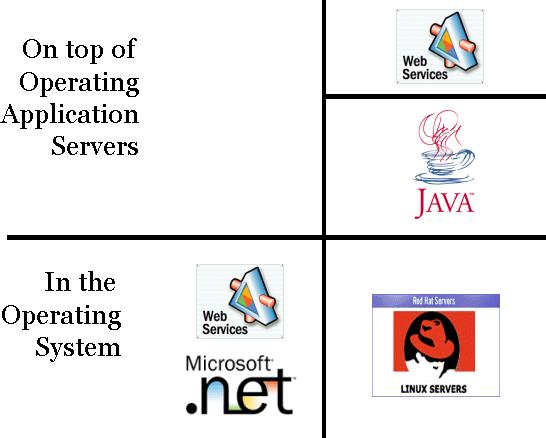| Service Oriented Enterprise |
|
Saturday, May 24, 2003 Patricia Seybold on BPM and SOA Patricia Seybold, suggests: "Beware of Business Process Management: Be Careful about Adopting Internally-Driven Business Processes; Instead, Design a Customer- Adaptive Enterprise Using a Services-Oriented Approach" http://www.psgroup.com/doc/products/2003/5/PSGP5-8-03CC/PSGP5-8-03CC.asp posted by jeff | 8:32 AM ZapThink reports on the professional services space ZapThink has released a new report on consulting firms that specialize in web service and service oriented architectures, see: http://www.zapthink.com/reports/ZTR-WS109.html I was happy to see Jason use the term, "Service Oriented Enterprise"... now, if I can only get the World Wide Grid to catch on :-) posted by jeff | 8:20 AM Friday, May 23, 2003 Jim Waldo is still ticked off Jim Waldo is a smart man. Sit down and talk with him and you'll quickly realize that he spends a significant amount of time thinking about software and distributed computing. Jim was early into distributed systems with CORBA and more recently led the Jini effort at Sun. For those of us that know the Java specs - we all know that Jini was one nice piece of software. We also know that it wasn't widely adopted. And Jim is still ticked off. Most recently, Jim took aim at the use of standards: http://www.artima.com/weblogs/viewpost.jsp?thread=4840 When I last talked to Jim, he was pissed off at the JXTA group for getting both the attention as well as getting the internal Sun research dollars. In "Waldo-World" everything can be done inside of Java! No need to worry about all that "other stuff" (RPG, COBOL, .Net, etc.) In my humble opinion, Jim is smoking dinosaur dope. Communications (a superset of distributed computing) is based on ubiquitous protocols. Why do we have them? Uh, to speed up adoption and to make all of the "unique" things in the world (including Jini) actually talk to each other. Does it slow down innovations? Yes sir. Does it make inter-application, inter-department, inter-business, inter-nation computing possible? Yep. Jim has a ton to offer the web services community. If he would quit ragging on standards, reverse engineer Jini and publish it in terms of open standards - I would back him 100%. Until then, good luck with Jini. FYI, my Jini book sits on my bookshelf right between my CORBA books and my DCE books. posted by jeff | 3:34 PM Monday, May 19, 2003 The Burton Group on Web Services See: http://www.burtongroup.com/promo/columns/column.asp?articleid=145&employeeid=3 "There really isn’t a big mystery as to why the Web services framework—the standards that define an XML-based distributed computing architecture—have gained a credible foothold so quickly. Competitive pressures, the need to reduce costs, and a variety of other business factors are driving enterprises to integrate business processes and IT. Enterprises are creating both internally and externally facing systems that tie employees, customers, partners, suppliers, contractors, and other constituents into their business processes, for example." posted by jeff | 7:05 AM Sunday, May 18, 2003 Phil Wainewright Kicks ASS I just finished reading the Loosely Coupled blog - and I realized that Phil kicks ass... and that's all I have to say about that. :-) posted by jeff | 6:00 PM Web Service Stack Implementations in the OS Although it isn't clear, it appears as though Microsoft will embed the web service protocol stack right into all of their many operating systems. Their release of the WSE as an add-on library, and it's relationship to IIS suggests that Microsoft feels that (like everything else) web services should be close to the kernel. Usually, I disagree with their monolothic OS thinking, but this time I tend to agree. If MS does this, it may force others to follow suit, namely Linux and other branded Unix flavors. This may cause a problem for IBM, BEA and other companies that want to sell you an application server (with web service enhancements). If MS drops the WS stack in the OS, this may cause IBM do to the same and then the Linux flavors may have to get in the game as well. I'm no rocket scientist, but this doesn't sound like good news for BEA and the other web service platform vendors. They would have to claim that either they had a superior implementation of the stack or rely on sales from the tooling (IDE, etc.) - which is a tough business. I also anticipate OEM relationships between groups like RedHat and groups like Systinet, Cape Clear and The Mind Electric...  I'm no Kernel specialist, but wouldn't the X-Kernel architecturesupport the WS-* stack? posted by jeff | 3:13 PM WS-Choreography Can't Differentiate So, I'm sitting here reading the meeting minutes from the W3C WS-Choreography, see: http://www.w3.org/2002/ws/chor/3/04/29-minutes.html and they can't seem to figure out what they are doing that has any value. They seem to have realized that just about everything they dream up has already been covered by BPEL or BPSS... yet they seem hell bent on keeping a working group together - from what I can tell, the purpose of the working group is to determine the purpose of the working group. I can only assume that the people that participate in this group don't like real work and would rather participate in a completely irrelevant working group. Personally, I'll go with BPEL. As the W3C participants debate what ws-choreography is - my company has finished our orchestration implementation of BPEL Now we are moving on to finding snafu's and areas for improvement that can be fed back into the spec... If it sounds like I think the W3C is dicking around with specifications that have already been written - you are right. KILL THIS WORKING GROUP. posted by jeff | 8:24 AM |
|
|||||||||||||||
|
|
||||||||||||||||